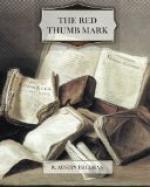CHAPTER XV
THE FINGER-PRINT EXPERTS
The hum of conversation that had been gradually increasing as the court filled suddenly ceased. A door at the back of the dais was flung open; counsel, solicitors, and spectators alike rose to their feet; and the judge entered, closely followed by the Lord Mayor, the sheriff, and various civic magnates, all picturesque and gorgeous in their robes and chains of office. The Clerk of Arraigns took his place behind his table under the dais; the counsel suspended their conversation and fingered their briefs; and, as the judge took his seat, lawyers, officials, and spectators took their seats, and all eyes were turned towards the dock.
A few moments later Reuben Hornby appeared in the enclosure in company with a warder, the two rising, apparently, from the bowels of the earth, and, stepping forward to the bar, stood with a calm and self-possessed demeanour, glancing somewhat curiously around the court. For an instant his eye rested upon the group of friends and well-wishers seated behind the counsel, and the faintest trace of a smile appeared on his face; but immediately he turned his eyes away and never again throughout the trial looked in our direction.
The Clerk of Arraigns now rose and, reading from the indictment which lay before him on the table, addressed the prisoner—
“Reuben Hornby, you stand indicted for that you did, on the ninth or tenth day of March, feloniously steal a parcel of diamonds of the goods and chattels of John Hornby. Are you guilty or not guilty?”
“Not guilty,” replied Reuben.
The Clerk of Arraigns, having noted the prisoner’s reply, then proceeded—
“The gentlemen whose names are about to be called will form the jury who are to try you. If you wish to object to any of them, you must do so as each comes to the book to be sworn, and before he is sworn. You will then be heard.”
In acknowledgment of this address, which was delivered in clear, ringing tones, and with remarkable distinctness, Reuben bowed to the clerk, and the process of swearing-in the jury was commenced, while the counsel opened their briefs and the judge conversed facetiously with an official in a fur robe and a massive neck chain.
Very strange, to unaccustomed eyes and ears, was the effect of this function—half solemn and half grotesque, with an effect intermediate between that of a religious rite and that of a comic opera. Above the half-suppressed hum of conversation the clerk’s voice arose at regular intervals, calling out the name of one of the jurymen, and, as its owner stood up, the court usher, black-gowned and sacerdotal of aspect, advanced and proffered the book. Then, as the juryman took the volume in his hand, the voice of the usher resounded through the court like that of a priest intoning some refrain or antiphon—an effect that was increased by the rhythmical and archaic character of the formula—




